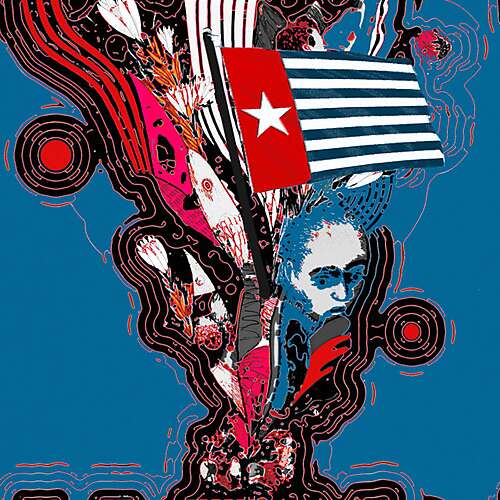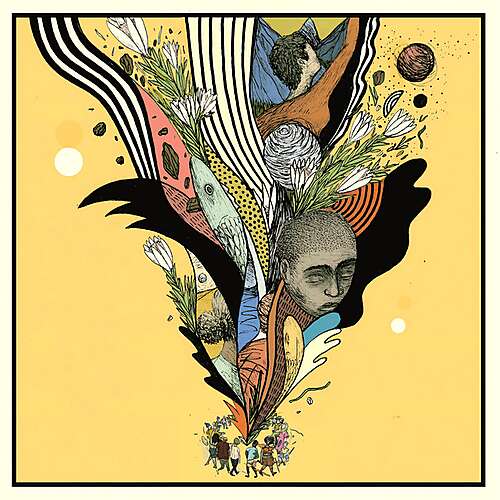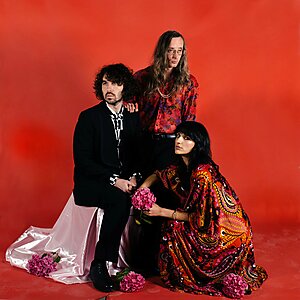Keleketla!
country: UK
genre: Indie, Jazz
styles: Chamber Psych, Indie Jazz
ABOUT THIS BAND
Keleketla! is an expansive collaborative project, reaching outward from Johannesburg to London, Lagos, L.A. and West Papua, “Keleketla!” started as a musical meeting ground between Ninja Tune cofounders Coldcut and a cadre of South African musicians (introduced by the charity In Place Of War), including the raw, South African-accented jazz styles of Sibusile Xaba, and rapper Yugen Blakrok (Black Panther OST). From those initial sessions, the record grew to encompass a wider web of musical luminaries, including Afrobeat architects, the late pioneer Tony Allen and Dele Sosimi, legendary L.A. spoken word pioneers The Watts Prophets, and West Papuan activist Benny Wenda.
The album collaborators are as follows:
South Africa sessions:
Yugen Blakrok, Nono Nkoane, Thabang Tabane, Tubatsi Moloi, Gally Ngoveni, Sibusile Xaba, Soundz of the South Collective, DJ Mabheko
London sessions:
Tony Allen, Shabaka Hutchings, Dele Sosimi, Ed ‘Tenderlonious’ Cawthorne, Tamar Osborn, Miles James, Joe Armon-Jones, Afla Sackey, Benny Wenda, The Lani Singers, Eska Mtungwazi, Jungle Drummer, DeeJay Random
Additionally, The Watts Prophets (Los Angeles) and Antibalas (New York) have contributed to the album.
The final product is a future-facing assemblage of influences, drawing connections between different points in a jazz-tipped, soulfully-minded spectrum; it builds outwards, from the solid musical foundations of those first sessions, featuring the likes of Thabang Tabane, esteemed percussionist and son of the legendary Phillip Tabane. On the one hand, there are gqom beats, interlaced with activist chants and and Tony Allen’s live Afrobeat drums; on the other, there are warm, lyrical meditations, aided by horns and keys. The name “Keleketla” means “response”, as in “call-and-response”, a title which speaks to the project’s aim: to build out a shared musical ground, traced across different recording sessions, continents apart.
It all started with Johannesburg’s Keleketla! Library, an independent library and media arts initiative, stocked since its 2008 inception with donated items from the local community. Run by artists and musicians Rangoato Hlasane and Malose Malahlela, they met Ruth Daniels of the charity In Place of War (where a portion of the proceeds from the record will go to) who asked who they would choose for a musical collaboration with South African artists. Ra and Malose named Coldcut. The UK duo responded to the invitation to make a trip to South Africa for the recording sessions (supported by the British Council) and so the story started to grow. The duo had long nurtured an interest in South African jazz, and it was through Mushroom Hour Half Hour co-founder Andrew Curnow, whose label and collective have been part of the vanguard of a new generation of jazz-influenced acts from Jo’Burg and beyond, that they were connected to the players for the sessions.
The main sessions took place at Soweto’s Trackside Studios, where they started a set of songs and settled down to rehearse and record them. Upon returning to the UK, Black and More sought out extra collaborators, setting up sessions with musicians who could expand and re-imagine the album’s horizons. In many cases, this meant building on the sessions in Soweto, such as in ‘Crystallise’, where Tamar Osborn’s sax parts were added to the lyrics that Yugen Blakrok laid down in Trackside. In other cases, they led to new tracks altogether, such as ‘Freedom Groove’, which came out of an off-the-cuff jam between Tony Allen and Matt Black; Allen’s drum part was taken to build a new track, overlaid with fat, battle-cry brass from Antibalas, and a powerful call to freedom from The Watts Prophets in L.A.
Music and politics is a recurring theme on the record, most notably on ‘Future Toyi Toyi’, recorded in Khayelitsha, which features a recording Black and More made of hip-hop activists Soundz of the South, singing a revolutionary chant, referenced in the title, combined with – amongst other elements – a gqom track by Durban producer DJ Mabheko for the single version. Their creation was partly inspired by their experiences with the Keleketla! Library, who held a party during their stay. At the party, they saw the library’s co-founder Hlasane mix a recording of a student chant into a fiery, uptempo moment in his set, sending the crowd into a frenzy. It was a moment where they were reminded of how closely entwined politics and music can be. “It was almost a religious experience,” recalls Black, “to see the effect music could have in galvanising the audience like this.”
Likewise, ‘Papua Merdeka’ centres around a political invocation. Led by Benny Wenda, it’s a call for freedom for the nation of West Papua from Indonesia, which Wenda fled in 2004 after being persecuted by the Indonesian military. He now leads a campaign from his home in Oxford, where the vocals for the track were recorded. Tony Allen, the rhythm behind Fela Kuti’s Afrobeat revolution, recorded the drums, along with Miles James, a guitarist who’s played with Michael Kiwanuka and Yussef Dayes, and who – as the son of an old family friend – featured in a Coldcut video when he was just a year old.
“Keleketla!” is about finding musical connections. Starting with the tight community around the Keleketla! Library, this project has grown out of those closely forged bonds that can develop around music. Recalling the records he was introduced to and friends made while in South Africa, More says, “There’s music lovers everywhere and that’s what we thrive with.” “Keleketla!” is about embracing that call-and-response tradition, and seeing where it takes you.
Releases
 LP
LP
Keleketla! Remixes
out on December 01, 2020
via Ahead Of Our Time
 LP
LP
Keleketla!
out on July 03, 2020
via Ahead Of Our Time
Similar Artists and Bands







